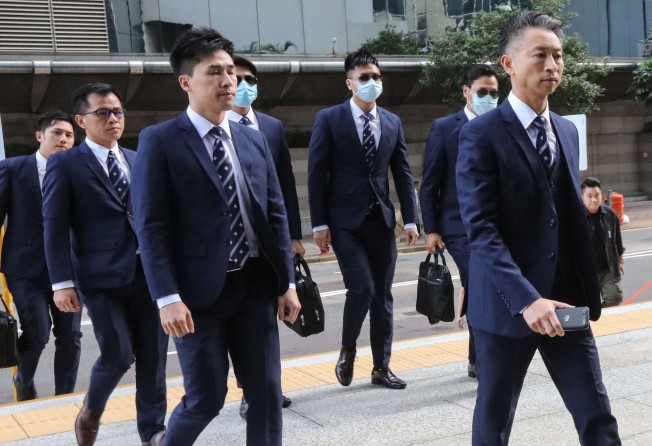Seven policemen convicted in Ken Tsang assault case spent HK$9 million on their defence
Lion’s share of sum went towards paying senior counsels Cheng Huan and Lawrence Lok Ying-kam

The seven policemen accused of maliciously beating up Occupy activist Ken Tsang Kin-chiu forked out at least HK$9 million to fend off the allegations, the Post has learned.
A source revealed that a large portion of the staggering sum – HK$6 million – went to senior counsels Cheng Huan and Lawrence Lok Ying-kam, the legal top guns who took on the active role of cross-examining witnesses during a trial that spanned almost eight months due to multiple adjournments.
The police source also said various unions across all ranks within the force had raised more than HK$10 million to “legally assist the police officers” and are expected to continue their financial support should the seven file an appeal.
The assault took place on October 15, 2014, three weeks into the 79-day Occupy protest and shortly after Tsang was arrested for pouring liquid onto other police officers. The beating came to light and created a public outcry as it was captured on video and aired on television news.
All seven denied one joint count of causing grievous bodily harm with intent.
Chief Inspector Wong Cho-shing, Senior Inspector Lau Cheuk-ngai, Detective Sergeant Pak Wing-bun and constables Lau Hing-pui, Chan Siu-tan, Kwan Ka-ho, and Wong Wai-ho were convicted of a lesser count of assault occasioning actual bodily harm at the District Court on Tuesday.
Chan, who denied an additional count of common assault, was also found guilty of slapping Tsang twice in an interview room at the Central Police Station, where Tsang was subsequently taken.
Support for the officers has poured in from colleagues since the beginning of the trial. The Post learned that some police officers took time off to sit in on the court proceedings.
One of Wong’s colleagues, a long-time friend of the chief inspector, said that he was not surprised by the court verdict and that Wong and Lau, a senior inspector, were definitely in the wrong for allowing their subordinates to be involved in the beating.
But the officer added: “If I were them, to put myself in their shoes, I would have done the same.”
He said that while police were expected to be “more professional than professional”, one needed to look at why the officers would had beaten Tsang, then a stranger, in the first place.
“Police officers were mentally and physically challenged by protesters every day ... to a point that they had reached a breaking point,” he said, describing the high-pressure environment at the time.
He noted that Tsang, whom he described as a “good man”, had himself poured water on police officers and was later convicted on one count of assaulting police and two of resisting police.
Adding that he might have done the same if he was Tsang, the officer said the protesters had been shunned by the government, so they turned to police officers to vent their anger.
The source, who preferred not to be named due to the sensitivity of the issue, described Wong, a friend of 10 years, as a “straightforward” person who usually followed the rules.